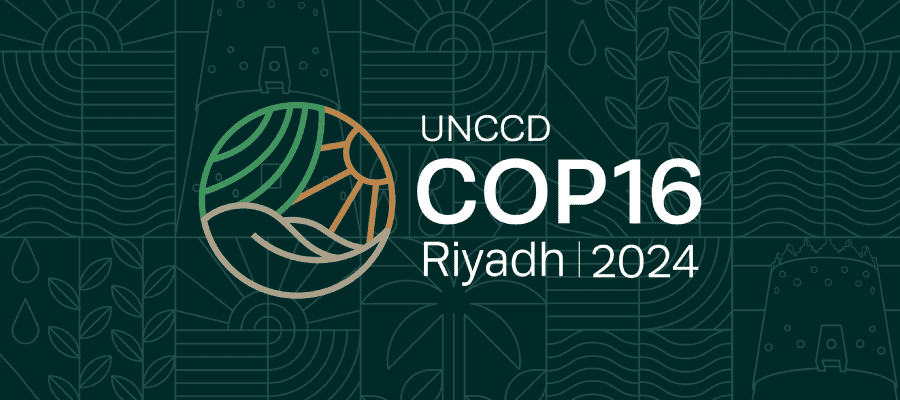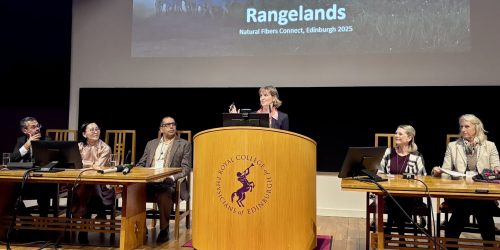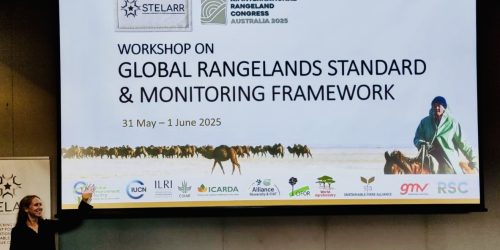At the 16th Conference of the Parties (COP16) to the United Nations Convention to Combat Desertification (UNCCD) in Riyadh, from 2nd to 13th December 2024, the Rangeland Stewardship Council (RSC) emerged as a key advocate for the future of sustainable rangeland management. Focused on land restoration, climate resilience, and sustainable investment, the RSC collaborated with global partners including the UNCCD, the STELARR Project, and the SFA to promote responsible rangeland management practices and highlight their vital role in combating environmental degradation. Through high-impact events, the RSC emphasised the importance of sustainable pastoralism and land stewardship as crucial drivers of ecosystem restoration and community resilience.
Key Events
- 4th December – Global Rangelands Standard: A Framework for Sustainable Pastoral Futures
In a session dedicated to advancing the future of rangelands, the RSC introduced the Global Rangelands Standard as a guiding framework for sustainable rangeland management. The discussion highlighted the role of certification and verification systems in promoting responsible land stewardship and supporting pastoral communities. - 4th December – COP Presidency Event on Rangelands
This high-level event convened policymakers, scientists, and community leaders to emphasise the critical need for rangeland protection and restoration. Una Jones, RSC Trustee, discussed the role of rangelands in climate mitigation, adaptation, and biodiversity conservation, as well as their importance in sustaining livelihoods. - 6th December – Valuing Grasslands: Multi-functional Landscapes for Biodiversity, Livelihoods, and Climate
Hosted by The Nature Conservancy, WWF, and BirdLife International, this session explored the ecological and economic value of rangelands. The RSC shared insights into the vital role rangelands play in supporting biodiversity, enhancing climate resilience, and sustaining livelihoods. The discussions also emphasised the importance of strengthening partnerships and fostering coordinated action among stakeholders, with a particular focus on initiatives linked to the 2026 International Year of Rangelands and Pastoralists. - 11th December – Sustainable Investment for Large-Scale Rangeland Restoration (STELARR)
The RSC presented on the development of a rangelands standard and stewardship certification scheme as part of the GEF-funded STELARR Project, which aims to unlock private sector investment for rangeland restoration. Implemented by IUCN and executed by IRLI and partners, the initiative explores financing models linked to sustainable livestock value chains across the Middle East, Central Asia, Latin America, and Africa. The session highlighted the role of certification in incentivising responsible land management and introduced a global rangeland monitoring framework to support and attract investment. - 11th December – Pastoralist Women Restoring Rangelands
The panel highlighted the leadership of women in rangeland restoration, featuring insights from experts and grassroots leaders on gender-inclusive approaches. Discussions emphasised the vital role of pastoralist women in restoration efforts and the importance of standards in ensuring equitable access to resources, decision-making, and economic opportunities. - 12th December – Sustainable Commodities & the RSC
The panel discussion, hosted by the RSC, explored how value chain resilience and market mechanisms support Land Degradation Neutrality while protecting landscapes and improving herder livelihoods. Experts discussed opportunities for businesses and policymakers to collaborate, turning regulatory challenges into solutions for resilient supply chains and sustainable livelihoods. The session emphasised the importance of research, monitoring, and adaptive learning in strengthening pastoralist communities and highlighted successful market-based approaches for rangeland restoration. Panelists stressed the need for cross-sector collaboration, from local communities to the private sector, to drive change and foster a more integrated approach to sustainability. - 12th December – Camelid Standard Development by the RSC
Focusing on the development of a global standard for camelid production, this session emphasised the importance of ethical and sustainable practices. Discussions covered animal welfare, land stewardship, and economic opportunities for camelid producers. The role of camelids in supporting nomadic and indigenous communities was highlighted, along with how certifications could strengthen value chains. Experts explored the RSC’s Camelid Standard within the Global Rangelands Standard framework, aiming to help herders secure better prices for their livestock.
Moving Forward
The RSC’s participation at COP16 reinforced the urgent need for coordinated action in rangeland management. By building strong, cross-sector partnerships and advancing practical frameworks like the Global Rangelands Standard, the RSC is setting the stage for a more sustainable future for rangelands. As we move forward, the RSC will continue to support impactful initiatives and empower communities to safeguard their land, livelihoods, and ecosystems.
To learn more about the RSC’s initiatives and ways to participate, visit our Get Involved page.





